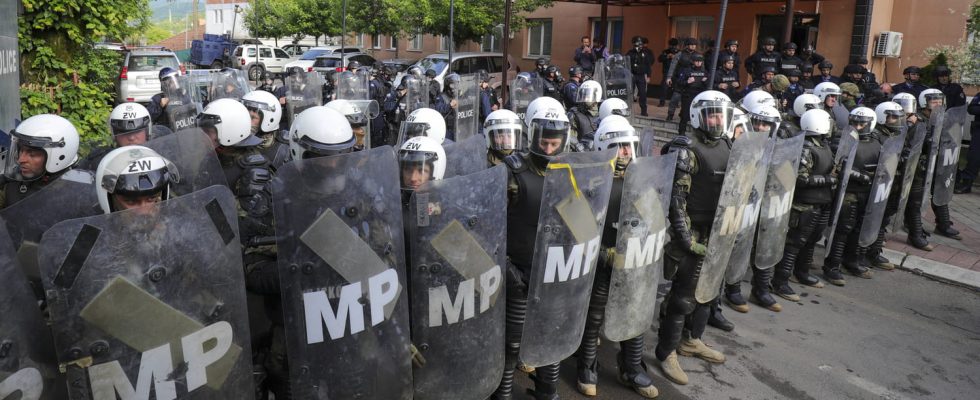Tension reappears in Kosovo. Clashes have erupted between Serbs and Kosovars since the election of Kosovar Albanian mayors in Serb-majority towns.
Novak Djokovic sparked the first controversy at the Roland-Garros tennis tournament: “Kosovo is the heart of Serbia! Stop the violence”, this is the message he wrote on the camera when leaving the court by Philippe Chatrier on Monday, May 29. The Serbian tennis player speaks in this way as tensions have been gaining in intensity since April in this small Balkan country.
An election set fire to the powder: the municipal elections. The Serbs boycotted them following the appeal of the Srpska Lista, the main Serbian party in Kosovo closely linked to Belgrade. Albanian elected officials were then elected in towns with a majority Serb population, with participation rates not exceeding 3.5% according to France 24.
Bullet wounds recorded in the clashes
These new city councilors were officially sworn in last week, which triggered spectacular Serb protests. Rallies outside the town halls of the four major Serb-majority cities degenerated. I’UN intervened via NATO: the forces of this military alliance then separated the two belligerents. The violence then escalated with protesters throwing stones, bottles and Molotov cocktails.
30 soldiers were injured in the clashes, indicated the KFOR (International Force in Kosovo led by the Atlantic Alliance) on Twitter. The press release even claims that “three Hungarian soldiers were injured by firearms”. Serbian President Aleksandar Vucic lamented the injuries of 52 Serb demonstrators, three of them seriously.
Why were the elections in Kosovo boycotted?
These elections took place in a particular context: in November 2022, the Serbs employed in the Kosovo administration mostly all resigned. They then challenged a decision by the government in Pristina aimed at prohibiting Serbs living in Kosovo from using Serbian license plates on Kosovo territory.
According to Alexis Troude, professor of geopolitics at the University of Versailles-Saint-Quentin-en-Yvelines (UVSQ) and Balkan specialist, explains it to France 24 “Each time, it’s the same thing: Kosovo multiplies the vexations against the Serbs. Pristina has never respected the 2013 agreements and regularly tries to establish its authority over northern Kosovo, provoking tensions with the Serbian population.” These 2013 agreements were to engrave in stone the creation of an association of ten municipalities with a Serb majority. But Kosovo did not respect its commitments for fear of seeing Serbia take possession of these territories.
Russia and the United States each support one of the two countries
US Secretary of State, Anthony Blinken, blamed Albin Kurti, Prime Minister of Kosovo, on these decisions having caused these frictions: “He strongly and unnecessarily aggravated the tensions”. The United States has also excluded the country from Defender 23, a joint military exercise program between 20 Western allies.
NATO has been present in Kosovo since 1999 to manage a peacekeeping mission. This military presence had intervened in the middle of the war having cost the lives of nearly 13,000 people. Kosovo then officially declared its independence in 2008, which Belgrade still refuses to recognize. This is neither recognized by the UN nor by the European Union even if the United States and its Western allies, such as France, recognize the country.
Religious and ethnic differences at the source of the conflict
The country is 90% populated by Muslim Albanians and 10% by Orthodox Serbs according to the JDD. The region has been affected by ethnic and religious conflicts since the break-up of Yugoslavia in 1992. Serbia does not recognize its independence, as this region is considered the national and religious cradle of the Serbs.
Moscow and Washington are once again opposed on this file: the Russians support the Serbs and the Americans support the Kosovars. The Balkan specialist, Alexis Troude believes that: “These tensions will one day lead to a war in Europe. The great powers have been activating local rivalries for 20 years and playing with fire. On the one hand, the United States reinforce the authority of Pristina, on the other, Russia supports Belgrade. Europe must wake up to avoid the worst.”
